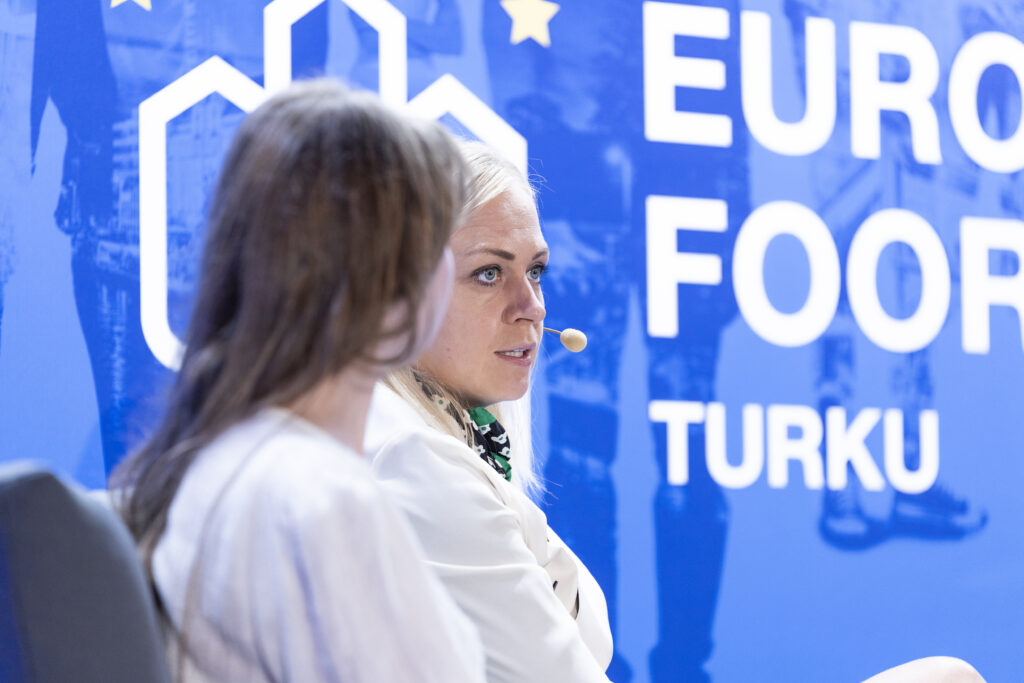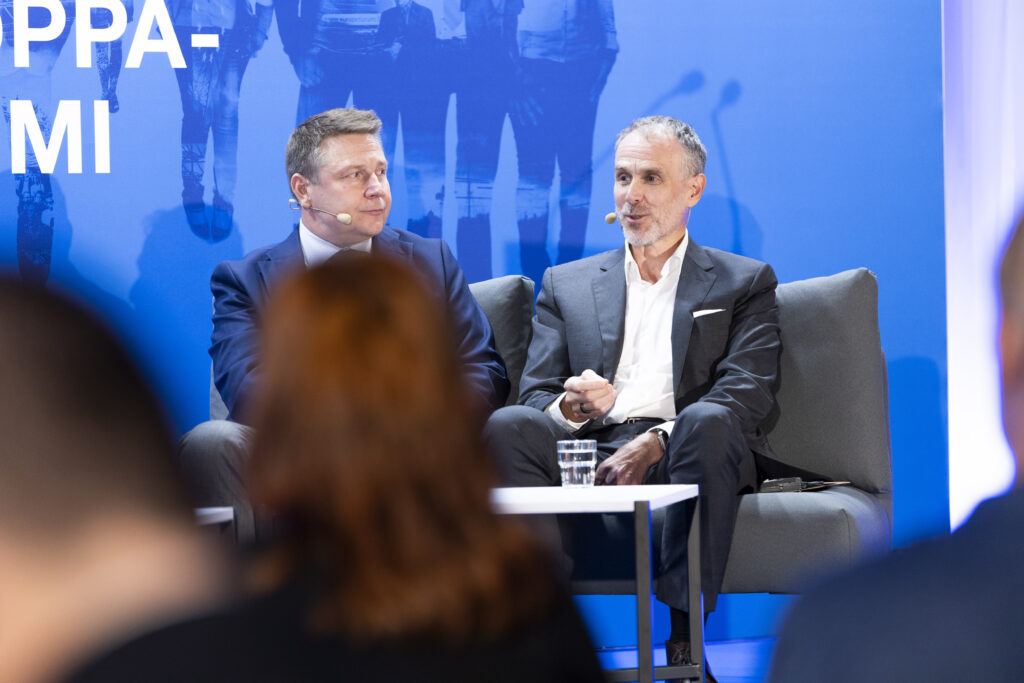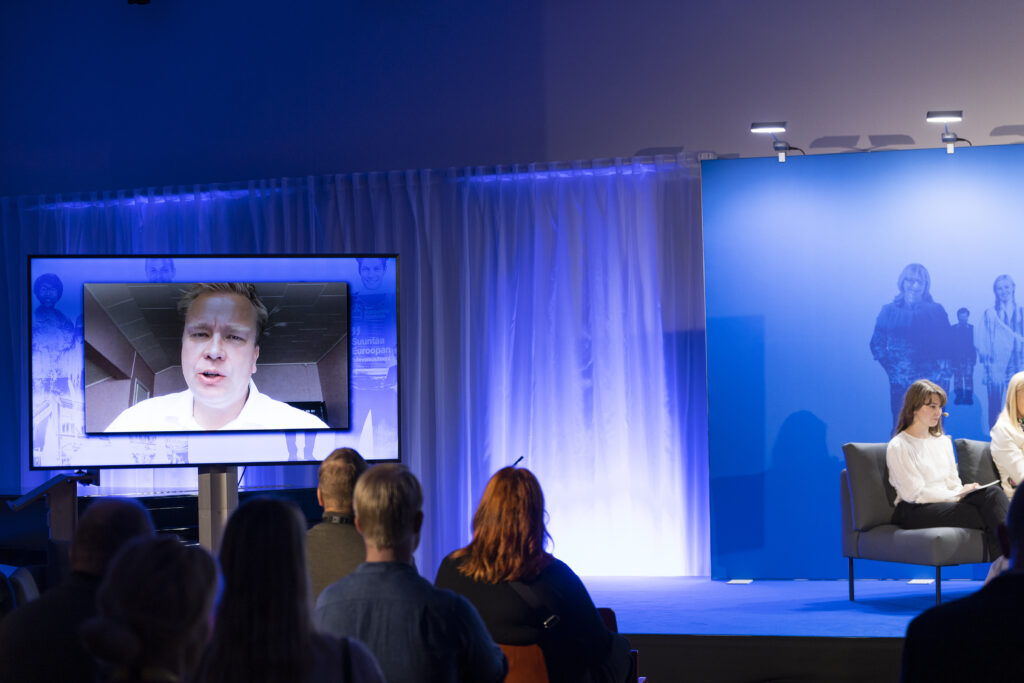World crises must not remain in the shadows – new opportunities for the EU in peace mediation
A debate organised by CMI at the Europe Forum in Turku explored the future of EU peace mediation. The war in Ukraine has meant that in Europe, other conflicts have received less attention. However, NATO’s focus on the defence of Europe opens up new opportunities for the EU to contribute to peace in the world. Finland’s expertise in peace mediation can be used in the Union.

Minister for Foreign Affairs Elina Valtonen stressed that the new government’s aim is to promote and increase Finnish mediation expertise. In the foreground Annastina Haapasaari, who moderated the debate. Photos: Maria Santto/CMI.
The Europe Forum, held in Turku, is Finland’s leading European policy arena, bringing together decision-makers and citizens. In early September, the CMI organised a panel on peace mediation at the forum titled ‘Peace Mediation as a Means of Strengthening European Security’. The topic was discussed by Foreign Minister Elina Valtonen (National Coalition Party), Centre Party MP and former Minister of Defence Antti Kaikkonen, CMI CEO Janne Taalas and Juha Jokela, Director of the European Union Research Programme at the Finnish Institute of International Affairs (FIIA). Annastina Haapasaari, Editor-in-Chief of The Ulkopolitist, moderated the discussion.
In Europe, world conflicts remain in the shadows
The war in Ukraine has united EU countries in an unprecedented way, but at the same time, with the war coming right on its doorstep, the Union has, in many ways, turned its gaze inward and ignored the many other conflicts in the world. “Rightly, supporting Ukraine is taking up a vast amount of our resources and ideas. But equally, we must continue our peace mediation efforts and our wider global engagement wherever there are conflicts,” said Foreign Minister Elina Valtonen.
Antti Kaikkonen said he was concerned that other crises worldwide were being overlooked. He cited, for example, the military coups in Africa, the latest of which has taken place in Gabon. “We cannot turn our backs on this development either, but we must pay sufficient attention to these issues as well.”
Juha Jokela highlighted the complexity of conflicts where non-state actors, such as armed groups, make it difficult to promote peace. “Conflicts and such complex conflicts have not disappeared from the world.”
He said it is important to understand that the war in Ukraine has a global impact on peace. At stake is a world order in which the borders of sovereign states are not moved by force. Jokela said the EU should be able to reinforce this message. Many emerging countries have criticised Europe for taking a different approach to Ukraine than to other conflicts. Janne Taalas said he hoped the war in Ukraine would help Europeans put themselves in the shoes of the millions of people affected by the conflict.
As the reality of the war has come closer, the EU has also learned what peace requires. A year and a half after Russia’s illegal invasion, Europe has learned to avoid actions that would seek to settle matters bypassing Ukraine, Valtonen said. Ultimately, the decision on peace and its terms lies with Ukraine. However, the EU can play an important role in creating the conditions for peace. Ukraine’s potential EU membership will affect its ability and willingness to negotiate peace,” said Jokela. “Yes, this is certainly one of the big motivating factors that tends to contribute to making peace happen.”

According to Juha Jokela (left), Programme Director at the FIIA, the EU is looking to Finland for peace mediation expertise. Janne Taalas, CEO of CMI, said NATO would bring peace mediation opportunities to Finland.
A greater role for the EU
Although the EU has turned inward and focused on the war in Ukraine, its opportunities to play a role in peace mediation have increased. For its part, NATO has strengthened its role in Europe, which opens the door for the EU to play a more visible role in the world, said Jokela. He stressed that the EU must have a strong political will to seize this opportunity. Efforts to promote peace would also help to dispel the suspicions about the EU in the so-called global South caused by the war in Ukraine. “Successes must be achieved in conflict resolution, dialogue and peace mediation.” The EU itself may not be able to mediate peace in conflict countries directly because of its colonial history, but it can support the peace efforts of others, such as organisations and individual states.
It would be important for the EU to use its own internal expertise, for example that of Finland. The new Finnish government aims to promote and develop Finnish peace mediation expertise. The focus will be on cooperation with peace mediation organisations such as the CMI. “We want to bring peace mediation more widely into Finland’s foreign and security policy so that we can bring to the world the expertise that we are known for, that we are good at and that we can continue to grow in”, said Foreign Minister Valtonen. The Finnish government is increasingly recognising the role of organisations, the Foreign Minister said. CMI is doing “tremendous work”, Valtonen said.
In Janne Taalas’ view, NATO membership offers Finland new opportunities in peace mediation. “NATO opens up new doors for us, new negotiating rooms.” Norway, known for its peace mediation, is an example of a NATO country that has used these opportunities.
Kaikkonen also pointed out that peace mediation is an important part of Finland’s foreign policy, which “cannot consist only of hard security”. “There must be sufficient tools in the toolbox to deal with different crises.” Jokela stressed that Finland’s long tradition and expertise in peace mediation is a strength in the EU. “Finland’s efforts in the field of peace mediation are something that is also taken into account in the Union. It is not necessarily so crowded there. In other words, there are expectations of the Nordic countries in general when peace mediation and related tasks are launched in the EU.”

Antti Kaikkonen, a former Defence Minister and Centre Party MP, says that there is a lot of work for mediation. “Unfortunately, there are many different crisis hotspots in the world.”
Being able to influence the root causes of conflicts
The panellists agreed on the importance of addressing the root causes of all conflicts. “In the long term, there is no alternative but non-military means, although the reality in Europe, for example, is now different,” said Taalas. The war in Ukraine has tended to militarise the EU’s foreign policy, but the panellists stressed the Union’s strengths in so-called soft means to promote peace. “Conflict prevention. Also very strong on crisis management. Democracy building,” said Valtonen.
“Peace mediation is best when the conflict does not even arise. We can, as it were, prevent it. The EU has a very good track record in this area. The whole existence of the EU is based on the peace project.”
Conflicts are also of great importance in the European context, as peacebuilding is a way to tackle issues such as terrorism and migration.
Long-term solutions were highlighted in the debate as a particularly important part of peace mediation, which is largely about creating a better future. Jokela also stressed that “peace must be just, lasting and open to opportunities for confidence-building.”
It is essential to genuinely listen to the parties to a conflict and help them build peace from their starting points and needs. This is one of the core principles of the CMI’s work. “This is something the EU could still learn from,” Taalas stressed. Because it is above all about listening, Finland also sees peace mediation as a good way to build relations with countries that are considering their alliances in the changing world order. Jokela said that the competition in peace mediation brought about by the changing world order and the geopolitical situation could force the EU to change its approach. “The competitive situation will compel the EU to consider the situation and needs of target countries in a broader way than it has done so far.”
The panellists agreed that peace becomes even more important when looking to the near future. “There are an unfortunate number of different hotspots in the world. At the very least, there seems to be work to be done in peace mediation. I would like to see the peace flag waved much more widely, both in Europe and globally,” said Kaikkonen.
The war in Ukraine underscores that peace cannot be taken for granted but requires continuous efforts. As Jokela observed: “While these are tough times for security, understandably, the idea of peace is on the minds of many people throughout Europe and the world. Even with peace, we must not be complacent that it is an achieved advantage, but that it must be rebuilt day by day and week by week.”
Watch the recording of the debate (in Finnish).